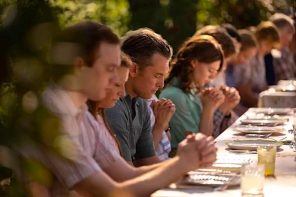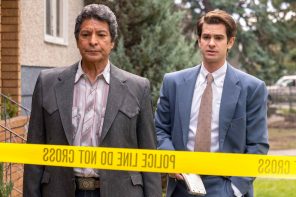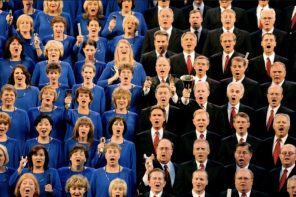Yes, world, it is true: not all Mormons are alike. That’s the news that’s making headlines as buzz continues to build about the nascent presidential campaign of former Utah governor Jon Huntsman, Jr.
Of course, I’ve been saying it for months here at RD: Romney is what many Mormons call a TBM—or “true-believing Mormon”—an orthodox believer and devout practitioner of the faith. Huntsman? Well, he’s something else—an other-than-orthodox Mormon of a variety that contemporary Mormonism may not yet have the vocabulary to describe.
Early Thursday morning, Matthew Bowman at the New Republic tried to spin the differences between Romney and Huntsman as generational and Huntsman’s more easygoing Mormon style as evidence of the LDS Church’s evolution from mid-20th century models of “business Mormonism” to a more cosmopolitan 21st century outlook. (Both Romney and Huntsman are baby boomers. Generational? I’m not so sure.)
But Time’s profile of Huntsman (also published Thursday morning) made it seem that there might be more profound differences at work in the Romney-Huntsman divide. Time’s Melinda Henneberger wrote:
And as for whether or not Huntsman still belongs to the Church of Latter-day Saints, I know less than I did before I asked him. (“I’m a very spiritual person,” as opposed to a religious one, he says, “and proud of my Mormon roots.”Roots? That makes it sound as if you’re not a member anymore. Are you? “That’s tough to define,” he says. “There are varying degrees. I come from a long line of saloon keepers and proselytizers, and I draw from both sides.”)
“Still belongs”? “Tough to define?” Those words quickly made headlines in the Mormon world and beyond, drawing heavy criticism from orthodox Mormons, and leading some observers to suggest that Romney and Huntsman represented two entirely different “strains” of the LDS faith. (A spokesman later clarified that Huntsman “remains a member of the church and proud to be part of the fabric of a large, vibrant faith.”)
To understand why Huntsman described his Mormonism as “tough to define,” it might help to understand the complicated world of Mormon identity politics.
What do you call a Catholic who grew up going to CCD but now attends mass only on Christmas, Ash Wednesday, and Easter, and supports gay rights? Catholic.
What do you call a Jew who loves bacon, doesn’t believe in God, and attends shul only on High Holy Days? Jewish.
What do you call a Mormon who attends church once a month or less and leans liberal? Depends on who you ask.
For orthodox Mormons, Mormon identity is simple: black and white; in or out. If you attend Church weekly, believe literally, and maintain orthodox standards of behavior, you count as Mormon. Otherwise, you don’t. (For the record, members attending once a month or more make up less than 20% of the 14 million members on the books of the LDS Church.)
For other-than-orthodox Mormons, Mormon identity is a more complicated spiritual and emotional mix, bound up in multiple factors like ancestry, upbringing, culture, experience, conviction, observance level, and institutional affiliation. And whereas religions with longer histories have generated multiple channels for religious practice—ranging, in the case of Judaism, from ultra-orthodox to reform and reconstructionists—there is only one Church of Jesus Christ of Latter-day Saints.
Of course, Mormon communities have always hosted our fair share of internal diversity. In the late 19th and early 20th centuries, when Mormonism was an isolated to a closely kinship-networked group of settlers in the intermountain West, Mormonism was home to all types—both “saloon keepers and proselytizers,” as Huntsman described his ancestors in the Time magazine interview. But over the course of the 20th century, as Mormons migrated out from the Wasatch front and assimilated into the world around us, we drew deeper lines between inside and out. And those lines have often been predicated on orthodoxy of thought and behavior.
In recent years, I’ve seen Mormon congregations embrace “Jack Mormons” (an insider term for a lapsed member), or liberal and unorthodox Mormons like me. But I’ve also seen Mormons characterize other Mormons as being “not Mormon” or even “anti-Mormon” (a term that carries a charge comparable to that of anti-Semitism) for expressing views that diverge from Church leaders on issues like women’s equality or gay rights. And I’ve seen orthodox Mormons shun their own relatives and encourage or even goad them to leave the LDS Church for perceived lack of orthodoxy.
That means that any Mormon who goes through the fairly common experience of being raised a literal believer and orthodox practitioner but transitions to a less orthodox worldview as an adult (or coming out as gay) may find themselves rejected by their family and their social community of origin and cut off from the major institutional sources of their primary identity. Faced with such rejection, some unorthodox Mormons have quietly begun to label themselves New Order Mormons or Post-Mormons. Some describe themselves as ex-Mormon, but maintain a profound interest in Mormon issues and happenings. And because the stakes are so high, many unorthodox Mormons try to maintain as much privacy as possible, or even hesitate to fully claim a Mormon identity in public, if they do not meet the standards of Mormonism’s most orthodox believers. Some want to avoid the kind of “no-win” situation admitting lack of orthodoxy often provokes in Mormon social contexts. Others do not want their unorthodox behavior to reflect poorly on a church they respect for its rigorous way of life.
It’s as complicated an identity politics as I’ve seen in any American community. Just this week, a good friend chided me, “I’m sure you’d feel more at home in Judaism. You can believe whatever you want as long as you mumble a few prayers and appreciate a good kugel.” And, man, do I love noodle kugel.
If he is an unorthodox or cultural Mormon, I completely sympathize with the tricky rhetorical position Huntsman has found and will continue to find himself in. But for Huntsman to say it is “tough to define” whether or not he is Mormon is like Chuck Schumer—a reform Jew who does not keep kosher and goes to synagogue on high holidays and whenever else it’s convenient—saying it’s “tough to define” whether or not he is a Jew. (For heaven’s sake, with bloodlines like his, Huntsman is basically Mormon royalty, and his wife was quoting LDS hymns to the Time magazine reporter.
And the truly unfortunate thing is that Huntsman’s slippery talk on Mormon identity may put him in bad a light as Mitt Romney, now infamous for his double-talk and “flip-flop” on healthcare. (Dana Milbank went so far as to compare Mitt to conjoined twins recently born in China. Ouch.)
In dodging the question of Mormon identity, was Huntsman acting the part of the slippery and crowd-pleasing politician? Or was he trying to negotiate the often difficult path of the other-than-orthodox Mormon? Either way, I claim him as a member of the tribe.
Editors’note: Joanna will be speaking about Mormon identity in the 21st century June 11 in Salt Lake City. More information is here.




